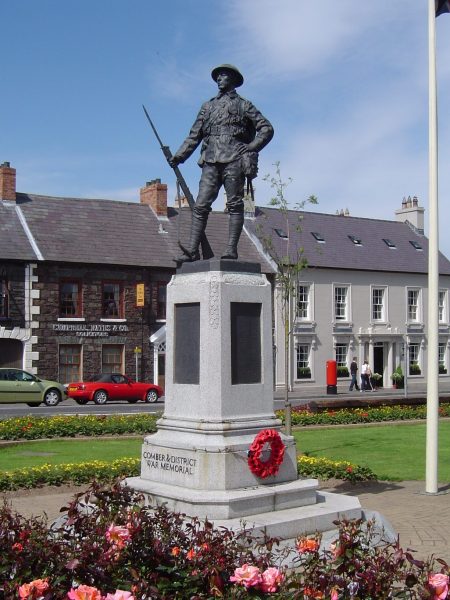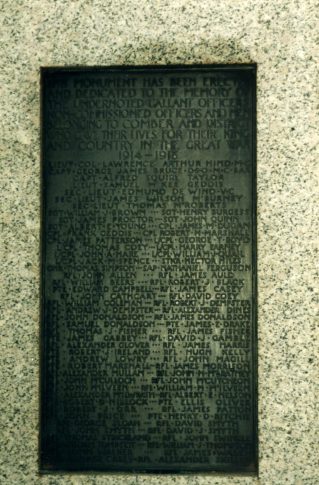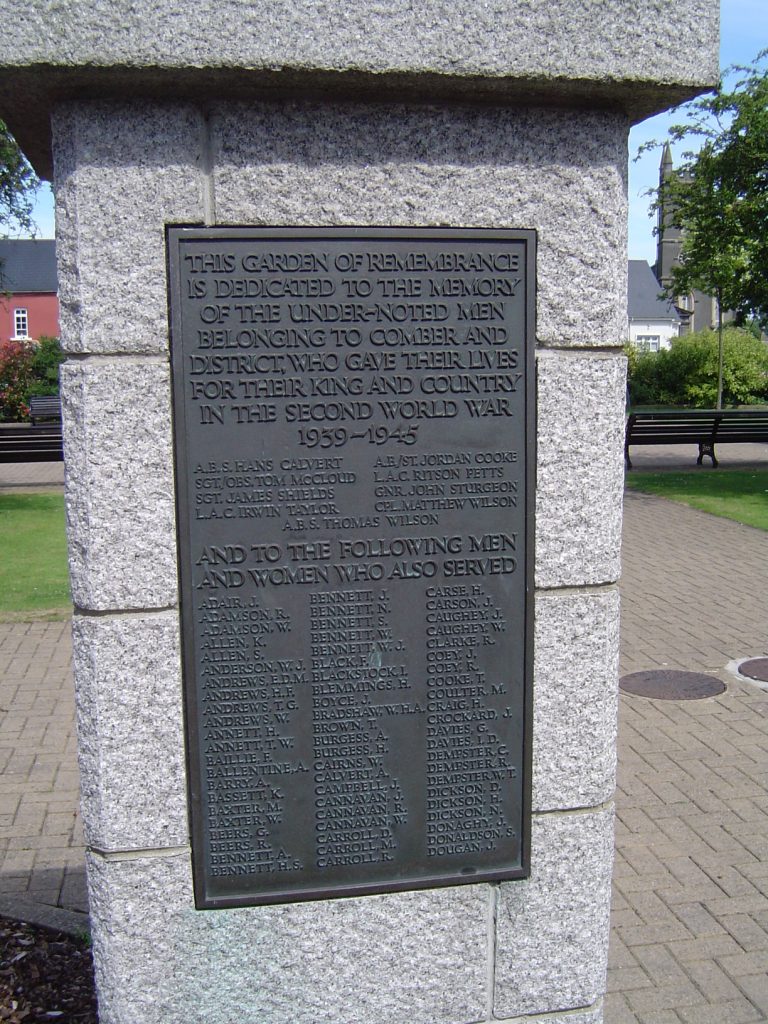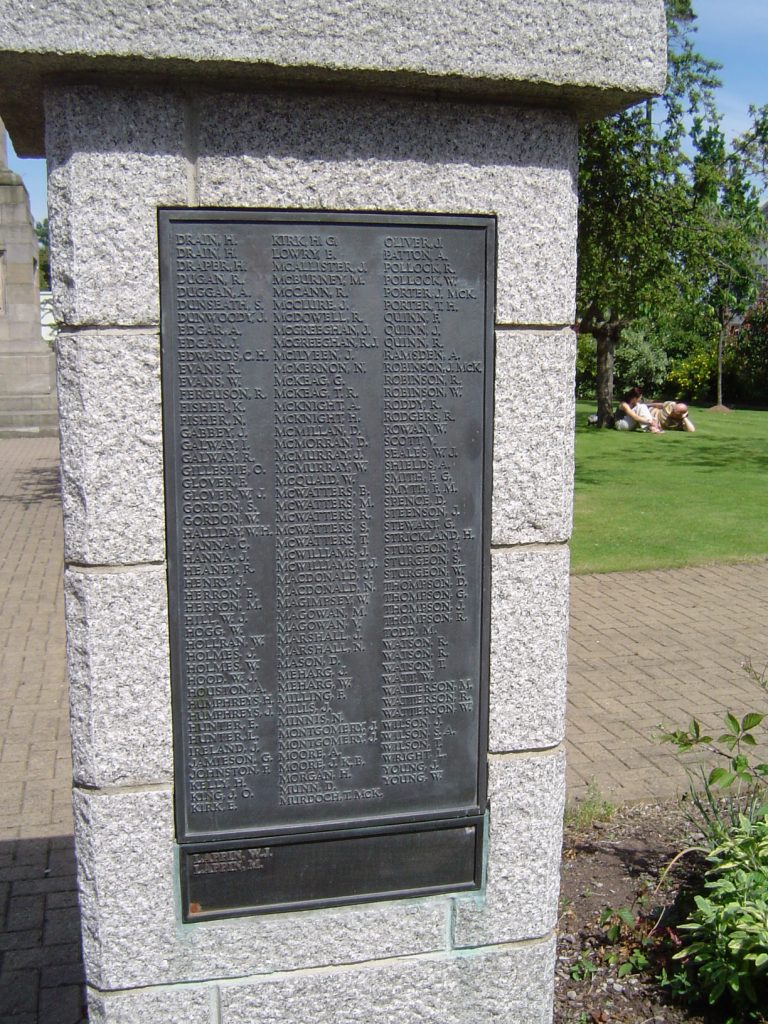COMBER, Co. DOWN.

THIS MONUMENT HAS BEEN ERECTED
AND DEDICATED TO THE MEMORY OF
THE UNDERNOTED GALLANT OFFICERS
NON-COMMISSIONED OFFICERS AND MEN
BELONGING TO COMBER AND DISTRICT
WHO GAVE THEIR LIVES FOR THEIR KING
AND COUNTRY IN THE GREAT WAR
1914–1918
Allen, John, Rifleman,
Auld, James, Rifleman,
Beers, William, Rifleman,
Black, Robert J., Rifleman,
Boyd, George T., Lance-Corporal,
Bruce, George James, DSO, MC, Bar, Captain
Brown, William John, Sergeant,
Burgess. Henry, Sergeant,
Campbell, Edward, Private,
Casey, George, Driver,
Casey, James, Rifleman,
Cathcart, John, Rifleman,
Coey, Thomas, Lance-Corporal,
Coleman, William, Rifleman,
Dempster, Andrew J., Rifleman,
Dempster, Robert J., Rifleman,
De Wind, Edward, VC., Second-Lieutenant,
Dines, Alexander, Rifleman,
Donaldson, John, Rifleman,
Donaldson, James, Rifleman,
Donaldson, Samuel, Rifleman,
Drake, James E., Private,
Dugan, James M., Corporal,
Earney, Harry, Lance-Corporal,
Ferguson, Nathaniel, Sapper,
Fisher, Thomas J., Rifleman,
Fisher, James, Rifleman,
Gabbey, James, Private,
Gamble, David J., Rifleman,
Geddis, Frank, Corporal,
Geddis, Samuel M. Kee, Lieutenant,
Glover, Alexander, Rifleman,
Hare, John A., Lance-Corporal,
Harris, James, Rifleman,
Hiles, Hector, Stoker, Royal Navy.
Hind, Lawrence Arthur, MC., Lieut-Colonel
Ireland, Robert J., Private,
Kelly, Hugh, Rifleman,
Lowry, Andrew, Private,
Magill, John, Rifleman,
Marshall, Robert H., Corporal,
Marshall, Robert, Private,
Morrison, James, Rifleman,
Mullan, Alexander, Rifleman,
McBratney, John H., Rifleman,
McBurney, James Wilson, Second-Lieutenant,
McCulloch, John, Rifleman,
McCutcheon, John, Rifleman,
M’Ilveen, John, Rifleman,
M’Ilveen, William M., Rifleman,
M’Ilwrath, Alexander, Rifleman,
McRoberts, Thomas, Second-Lieutenant,
Nelson, Albert E., Rifleman,
Niblock, Robert D., Rifleman,
Oliver, Ellis, Private,
Orr, Robert J., Rifleman,
Patterson, James, Corporal,
Patton, James, Rifleman,
Price, John, Rifleman,
Proctor, James, Sergeant,
Quaile, William J., Lance-Corporal,
Quinn, John, Sergeant,
Ritchie, Henry D., Private,
Simpson, Thomas, Gunner,
Skillen, George, Rifleman,
Sloan, George, Rifleman,
Smyth, David, Rifleman,
Smyth, John, Rifleman,
Smyth, David J., Rifleman,
Spence, Jack M., Lance-Corporal,
Strickland, Thomas, Rifleman,
Swindle, John, Rifleman,
Taylor, Alfred Squire, Captain,
Thompsett, William, Private,
Thompson, William J., Rifleman,
Walker, John, Private,
Walsh, James, Rifleman,
Young, Albert Edward, Sergeant,
THIS GARDEN OF REMEMBRANCE IS DEDICATED TO THE MEMORY OF THE UNDER-NOTED MEN BELONG TO COMBER AND DISTRICT, WHO GAVE THEIR LIVES FOR THEIR KING AND COUNTRY IN THE SECOND WORLD WAR 1939-1945
Calvert, Hans, Able Seaman [Signalman]
Cooke, Jordan, A.B./ST.
McCloud, Tom, Sergeant Observer.
Petts, Ritson, Leading Aircraftman
Shields, James, Sergeant,
Sturgeon, John, Gunner,
Taylor, Irwin, Leading Aircraftman
Wilson, Matthew, Corporal,
Wilson, Thomas, Able Seaman,




The Unveiling and Dedication Ceremony.
Comber and District war memorial was unveiled and dedicated on Saturday afternoon 14th April 1923 in the presence of very large concourse of people. It has been erected in the Square beneath the shadow of the monument which perpetuates the memory of a great Comber hero of bygone days-Sir Robert Gillespie- and takes the form of a bronze statue of an infantryman in full service equipment. On a bronze tablet sunk into the front of the granite pedestal, which forms part of the monument, appears the names of the officers and men belonging to the town and district who gave their lives for their King and country, whilst the names of those who served are inscribed on similar tablets on the back and sides of the pedestal. Both lists are very long and speak volumes for that loyalty and gallantry which has always been outstanding characteristics of the men of Comber. On the other side of the square there has been placed a heavy German gun, presented to the town by the British Government in recognition of the heroism of the Comber V.C.-the late Second-lieutenant Edmund de Wind.
The memorial statue, which is the work of Mr. L. S. Merrifield, sculptor, cost £1,200, and this amount was raised by local subscriptions. It is a handsome addition to the town and a fitting tribute to the bravery and self-sacrifice of her sons.
The Marquis of Londonderry, K.G., who was accompanied by Lady Londonderry and Viscount Castlereagh, presided at the impressive ceremony, and the statue was unveiled by Mrs. L. A. Hind, Adare, sister of the Right Hon., J. M. Andrews, D.L., M.P. Rev. Canon Manning. M.C., M.A., C.F., offered the dedicatory prayer and paid a glowing tribute to the deeds of the men of Ulster in the great war. Right Hon., J. M. Andrews read the names of the fallen and spoke in feeling terms of the heavy bereavements which the community had sustained.
In addition to those mentioned, the platform party included Sir Charles and Lady Wickham and Mrs. T. J. Andrews. The Right Hon., Lord Justice Andrews wrote regretting that his judicial duties at Downpatrick prevented him being present at that service of gratitude and remembrance. “Comber” he added, “has a war record of which it has reason to feel justly proud and it is therefore, only fitting that the gallantry and sacrifice of her sons should find some permanent memorial in our town, where it will serve to commemorate the noble deeds of our fallen heroes, and to inspire future generations of Combermen with the spirit of loyalty and devotion to duty.”
The greater part of the ceremony took place in a heavy downpour of rain, but the entire programme was proceeded with, and the vast crowd remained throughout.
The Comber Amateur Band was in attendance and, prior to the ceremony, headed the ex-Service men of the district through the principal thoroughfares to the place of the meeting.
On the command of Comrade J. Brown, seconded by Comrade H. Proctor, the chair was taken by the Marquis of Londonderry.
The ceremony opened with the singing of the hymn. “O God, our help in ages past,” led by the North Down Choral Society.
Lord Londonderry said he was glad that they had been good enough to choose him to occupy the position of chairman at that great gathering. His family, he was glad to think, was well known to them, and he was glad that Lady Londonderry and his son had accompanied him there that day. It was a tribute which they were only too anxious to pay to those of their fellow townsmen and fellow countrymen who took part in the great war. He did not feel that on such an occasion, when their hearts were very full, that that they would expect him to say much to them. They were all thinking of exactly the same thing. They were shortly to see their memorial unveiled-a memorial which was the simple work of the hands of men, but as long as human things remained in this world that monument would stand as a silent and eloquent testimony to the deeds of that generation who lived and who died in the Great War. But there was something deeper than the actual tangible monument they saw; it was the idea it conveyed –the meaning which the erection of the monument stood for-and that was why they felt proud on that occasion. In his short experience he could remember three appeals being made to the men of Ulster, and those appeals had all been in the cause of freedom-for the purpose of establishing the ideal which, he believed was engrained in the hearts of every Ulsterman-and each time the Ulstermen had responded. In the Great War they made their firm and true response; they flocked to the colours, and every man did his duty in the cause of freedom. They honoured those who served; they honoured those who fell. They were proud in the thought of those who made the great sacrifice, and he felt that there was no better or more fitting tribute that they could pay to the men of Comber that that Mrs. Hind, a member of the family of Andrews, whom they all loved and revered in that neighbourhood, and who herself had borne a great sacrifice and had descended to the depth of the greatest sorrow, should unveil that memorial. And yet, he did not feel that there was any need for them to wonder or marvel at the deeds of the men of Comber. Everyone of them was born beneath the shadow of the monument which stood behind them, and when they realised that the words of that great man (General Gillispie): “One more shot for the honour of Down,” had been the watchword of every boy in Comber, surely they need not feel surprised at the response which they made to the appeal of the country in 1914.
Mrs. Hind then unveiled the memorial.
Rev. Canon Manning said he esteemed it a high honour that he should have been asked to dedicate the memorial and also to pay a tribute, however brief and inadequate, to the men who fought and the men who fell. He realised, of course the chief, if not the sole reason, why that honour had been conferred upon him was this, that for a considerable period at home and also when he went to France he had the great privilege of being attached as chaplain to the 13th Battalion of the R.I.R. in which battalion so many of the men of Comber found a place. They had met together that afternoon to unveil and dedicate the Comber and district war memorial. The statue that had just been unveiled would be a lasting record as long as the town of Comber endured of the finest thing that Comber ever did, of the greatest and the noblest sacrifice that the men of Comber ever made. They all knew how splendidly Ulster did in the war; what a magnificent response she made to the appeal of King and country, and he said without the slightest fear of contradiction, that no town of its size or population did better than and few did as well as the town of Comber. What could he say on that occasion in the way of an adequate tribute to the great endurance and cheerfulness of the men of the Ulster Division, with which he was privileged to serve. He was with them at Thiepval on that historic day, the 1st July 1916, when they captured five lines of German trenches, but did so at the terrible cost of 228 officers and 5,000 men. So gallantly did they fight, so splendidly did they acquit themselves, so incomparable were they in valour, that a great English statesman, without the slightest exaggeration, speaking of that exploit, said that they had covered themselves with undying fame. Against overwhelming numbers, against weapons more deadly and diverse that the past had ever seen against death from hostile aircraft, against streams of liquid fire, against the poison gas that choked and burned they stood undaunted, firm, and unafraid. They remembered that day with great pride and gratitude the noble part played in the great war by the men whose names were inscribed upon that monument. The splendid achievements of those men, their dauntless courage, their patient endurance, their splendid spirit of self-sacrifice would long last in their memories. It would be to their undying shame if they ever forgot them, if they ever showed themselves unworthy of their noble sacrifice. He could not help thinking that the men who fought and fell found a fitting and worthy expression in the inscription on the base of a wooden cross in a military cemetery at Mesnil, where he had the melancholy duty of burying the first two men belonging to the 13th R.I.R. who fell in the war. The inscription read thus:- “Tell England all ye who pass by this monument that we, who died serving her, sleep here content.” The ages had not forgotten and never would forget the splendid stand of the Spartans at Thermopylac; they had not forgotten and never would forget the heroism of the Greeks at Marathon, and he was quite sure that ages would never forget the heroism of the fine men, sailors and soldiers, who in the great war gave all and laid down their lives that they and he might live. A nameless grave in France or Belgium or on the shores of Gallipoli or far Mesopotamia might cover their remains, but their memories in the hearts of the people of the town from which they came would never die.
The Right Hon., J. M. Andrews, M.P. read out the names of those who fell in the war, after which he said he desired to take the opportunity to say a few words on behalf of his sister, Mrs. Hind. She had asked him to express her warm thanks to the ex-Service men for the honour that they had paid her in asking her to unveil the Comber war memorial. Sympathy was one of those irrepressible forces which united mankind, and Mrs Hind appreciates that she had been that day thus honoured, because of the sympathy which their x-Service men had for her owing to the irreparable loss which she had suffered through the great war. She was conscious that on the present occasion she had represented not only herself, but also those who with her had been bereaved, and to whom she was further drawn by no ordinary ties. She realised all too well that above many homes in that town and district clouds continued to hang, and that within the lamp burned dimly. He was sure, however that they all must feel with her that bright and undying were the memories which their dear ones had left behind. It was not, however of those whom they had lost for a time that they alone thought that day. They remembered also with gratitude and with pride their companions-in-arms who, under the providence of God, had returned and whose names were also inscribed on that memorial. The other day, when looking over some old newspapers, his eyes caught a paragraph in a speech delivered by his father 25 years ago. He said: – “In my mind, we are too apt to forget the gallant deeds of those who have fought, suffered, and risked their lives for us. We have long service retired private soldiers with medals on their breast in almost every village in the land, and when age and infirmity have at last unfitted them for adding to their small pensions by honest labour, we leave them to choose between the workhouse and semi-starvation in a hovel. We disgrace ourselves thereby.” He thought they would agree that those were the words of an Ulsterman-and a Comberman-who loved his country and his brother man. They expressed the position at the time when he spoke, but he (Mr. Andrews) trusted they might never be true in the days to come. He had quoted those words lest they should forget what they owed as a nation and as individuals to the Empire’s warrior sons who risked all for the honour and the glory of their native land. (Applause)
The “Dead March” in Saul was then played by the Comber Amateur Flute Band, after which the dedicatory prayer was offered by Canon Manning. Buglers of the 1st Battalion Seaforth Highlanders sounded the Last Post.
A large number of wreaths were afterwards placed at the base of the monument. Amongst these were floral tributes from the British Legion Club, the Comber Spinning Mill, Comber Stitching Factory, Homing Pigeon Society, Ormiston Football Club, the Boy’s Brigade, Comber Ladies Orange Lodge, the Black Preceptory, and Comber District L.O.L.
The proceedings concluded with the playing of the National Anthem by the band and the Reveille sounded by the Seaforth buglers.
The names of the following, who made the supreme sacrifice, appear on the memorial.
John Allen, James Auld.
William Beers, Robert John Black, George T. Boyd, George James Bruce, William John Brown, Henry Burgess.
Edward Campbell, George Casey, James Casey, John Cathcart, Robert Clarke, David Coey, Thomas Coey, William Coleman.
Andrew John Dempster, Robert J. Dempster, Edmund de Wind,
Alexander Dines, James Donaldson, Samuel Donaldson, John Donaldson, James E. Drake, James Munn Dugan,
Harry Earney,
Nathaniel Ferguson, Thomas James Fisher, James Fisher,
James Gabbey, David John Gamble, Frank Geddis, Samuel M. Geddis, Alexander Glover, John Haire, James Harris, Hector Hiles,
Lawrence Arthur Hind,
Robert John Ireland,
Hugh Kelly,
Andrew Lowry,
John Magill, Robert Henry, Marchall, Robert Marshall, James Morrison, Alexander Mullan, John Henry McBratney, James Wilson McBurney,
John McCullough, John McCutcheon, John McIlveen, Alexander McIlwrath, Thomas McRoberts,
Albert Edward Nelson, Robert Douglas Niblock,
Ellis Oliver, Robert James Orr,
James Patterson, James Patton, John Price, James Proctor,
William James Quaile, John Quinn,
Henry D. Ritchie,
Thomas Simpson, George Sloan, David Smyth, John Smith,
David John Smyth, Jack M. Spence, Thomas Strickland, John Swindle,
Alfred Squire Taylor, William Thompsett, William John Thompson,
John Walker, James Walsh,
Albert Edward Young.
Newsletter Monday 16th April 1923.
If you can supply additional information, photographs of War Memorials in the nine counties of Ulster, or wish to report errors, broken links, make comments, suggestions, requests, etc. please email
uwms@outlook.com
All contributions will be acknowledged.
Research undertaken when time permits.